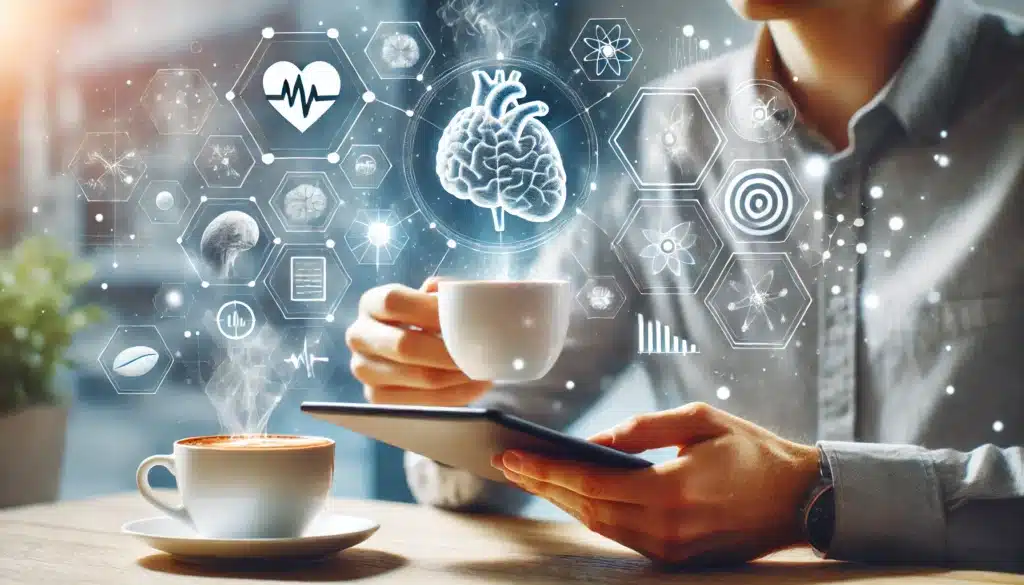Coffee is one of the most consumed beverages in the world — and one of the most studied. But how exactly does it affect your brain, body, and overall function? From its stimulating effects to its long-term impact on health, coffee interacts with multiple systems in fascinating ways.
In this article, we break down what happens from the first sip to the last drop — and how science explains the power of coffee.
1. Caffeine: The Primary Active Compound
The most well-known compound in coffee is caffeine, a natural stimulant.
It works by blocking adenosine, a neurotransmitter that causes drowsiness, leading to:
- Increased alertness
- Reduced fatigue
- Improved concentration
This effect can be felt within 15 to 45 minutes of drinking coffee.
2. Boosting Brain Function
Caffeine enhances the release of dopamine, norepinephrine, and serotonin, which help improve:
- Memory and learning
- Mood and motivation
- Reaction time and focus
Short-term cognitive benefits make coffee a go-to for mental tasks and productivity.
3. Effects on the Central Nervous System
Coffee acts as a central nervous system stimulant, which is why it:
- Increases wakefulness
- Enhances mood
- Can temporarily relieve headaches or migraines
However, too much caffeine may lead to restlessness, jitteriness, or sleep disturbances.
4. Coffee and Your Heart
Contrary to old myths, moderate coffee intake may benefit heart health.
It may:
- Improve vascular function
- Reduce inflammation
- Lower risk of stroke and coronary disease (in regular, moderate consumers)
Caffeine can slightly raise blood pressure in sensitive individuals, but this effect is usually temporary.
5. Metabolism and Fat Burning
Caffeine stimulates your metabolic rate, which can increase fat burning and calorie expenditure.
It boosts levels of epinephrine (adrenaline), helping the body:
- Mobilize fat from tissues
- Improve physical performance
- Enhance endurance in athletes
That’s why many fitness supplements include caffeine as a key ingredient.
6. Mood and Mental Health
Coffee consumption is associated with:
- Lower risk of depression
- Enhanced emotional resilience
- Improved social interaction
These benefits are linked not only to caffeine, but also to the ritual, aroma, and comfort of coffee drinking.
7. Antioxidants and Inflammation
Coffee is rich in polyphenols and antioxidants, including:
- Chlorogenic acid
- Caffeic acid
- Trigonelline
These compounds help fight oxidative stress, reduce inflammation, and protect cells — supporting everything from brain to skin health.
8. Effects on Digestion and the Gut
Coffee stimulates the production of stomach acid and bile, aiding digestion.
It may also:
- Promote a healthy gut microbiome
- Improve bowel movement regularity
- Act as a mild diuretic
However, excessive intake can irritate the stomach in sensitive individuals.
9. The Liver and Detoxification
Studies show that coffee supports liver function by:
- Reducing risk of fatty liver disease
- Lowering markers of liver enzymes
- Decreasing risk of cirrhosis and liver cancer
Decaf coffee also has these effects, suggesting non-caffeine compounds play a role.
10. Tolerance and Dependence
Regular caffeine use leads to tolerance, meaning the effects decrease over time. This is due to:
- Increased adenosine receptor sensitivity
- Adaptation of neurotransmitter levels
Some people experience withdrawal symptoms — like headaches, irritability, or fatigue — when cutting back. Gradual reduction helps avoid these effects.
Final Thoughts: More Than Just a Buzz
Coffee is not just a source of caffeine — it’s a complex biochemical experience that influences your energy, focus, mood, digestion, and long-term health.
Understanding how it works allows you to enjoy it more intentionally, tailoring your intake to your body and lifestyle. In moderation, coffee is both a science and a pleasure.







